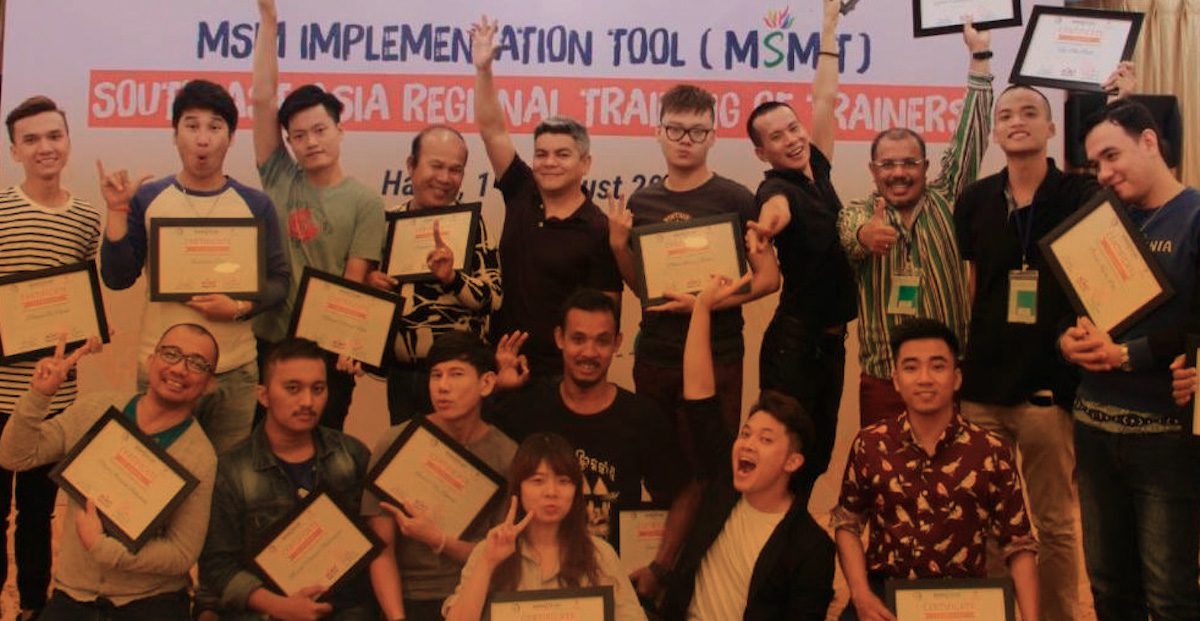The SHAG Consortium
The SHAG (Sustainable Health Advocacy with Gay Men) Consortium is a global collective of five networks working to catalyze movements to decriminalize homosexuality and steer HIV-related investments towards programming for gay men and other men who have sex with men (MSM).
| Grantee type: Global Consortium |
| Grant: $2,420,000 |
| Grant period: 2019-2021 |
| Lead organization: Mpact (Formerly The Global Forum on MSM & HIV (MSMGF)) |
Partner organizations:
|
SHAG members include the global network MPact along with Reseau Africagay Contre le Sida (AGCS) in West and Central Africa; the Eurasian Coalition on Male Health (ECOM) in Eastern Europe and Central Asia; GayLatino in Latin America; and M-Coalition in the Middle East and North Africa.

- Worldwide data show that gay men and other MSM are at higher risk for HIV and other sexually transmitted infections (STIs) than the general population. For example, gay men and other MSM account for an estimated 41% of new infections in Latin America, more than 25% of new HIV infections in Asia and the Pacific and the Caribbean, about 20% of new infections in Eastern Europe and Central Asia (EECA) and the Middle East and North Africa (MENA) regions, and an estimated 12% of new infections in West and Central Africa.
- MSM also have less access to safe, competently delivered health services. Disparities are fueled in part by systematic human rights violations in every region of the world, including discrimination, criminalization, a lack of protection by police, and violence and abuse from police. This potential for discrimination, violence, and other human rights violations creates barriers to access to health services.
- During the past decade, global HIV funders such as the Global Fund and PEPFAR have made efforts to increase attention to HIV among gay men and other MSM, but national HIV programs struggle to tailor and fund health services to be appropriate, accessible, and accountable to population needs. No low- or middle-income country is reaching MSM or other key populations at sufficient scale to control epidemics of HIV and STIs. Furthermore, the trend of national health financing and integration of HIV programs into broader health programming threatens the limited targeted HIV programming that exists.
- Gay men and other MSM have important direct experience of HIV-related health needs and barriers to health services. The capacity of networks of gay men and other inadequately served populations (ISPs) to organize and advocate is central to efforts to improve human rights environments, improve HIV service accessibility, and improve efficiency and effectiveness of national and international funding for health and human rights.
RCF funding 2019-2021
The SHAG Consortium received US$ 2.42 million in funding from the Robert Carr Fund for work during 2019-2021. This funding is allocated to both core and strategic program costs to help build the capacity of each of the five consortium partners and to support collective action globally.
Geographic coverage
The SHAG Consortium includes networks focused on West and Central Africa; Eastern Europe and Central Asia; Latin America; and the Middle East and North Africa.
Population coverage
The SHAG Consortium is focused on the global empowerment, leadership, health and rights of gay men and other men who have sex with men (MSM).
Activities 2019-2021
With RCF funding in 2019-2021, the SHAG Consortium will
Sponsor trainings and coalition meetings of gay men to increase legal literacy and develop strategies to confront and overturn criminalization laws.
Support country-level advocacy for human rights, including engaging the corporate sector as a partner, supporting test-case litigation, and mobilizing international support for human rights emergencies in countries if needed.
Support regional advocacy for human rights, including at the African Commission for Human and People’s Rights (ACHPR), the Organization of American States (OAS) and the Inter-American Commission on Human Rights.
Sponsor trainings and coalition meetings of gay men to increase understanding of national health programs and develop methods for monitoring national health budgets and monitor quality and accessibility of health services, including basic sexual health services for gay men and other MSM.
Intended results 2019-2021
The intended results from this work during 2019-2021 will include:
Network strength and influence: Gay men in West and Central Africa, the Middle East and North Africa, Eastern Europe and Central Asia and Latin America will work together to share information, develop globally aligned strategies and build capacity for advocacy and services.
Human rights: Activists will challenge criminalization of homosexuality in multiple countries, will mobilize international support for human rights emergencies in countries if and as needed, and will advocate for decriminalization and human rights at regional human rights entities of the African Commission for Human and People’s Rights (ACHPR), the Organization of American States (OAS) and the Inter-American Commission on Human Rights.
Resource accountability: Networks will sponsor trainings and coalition meetings of gay men to increase understanding of national health programs and develop methods for monitoring national health budgets and monitor quality and accessibility of health services, including basic sexual health services for gay men and other MSM.